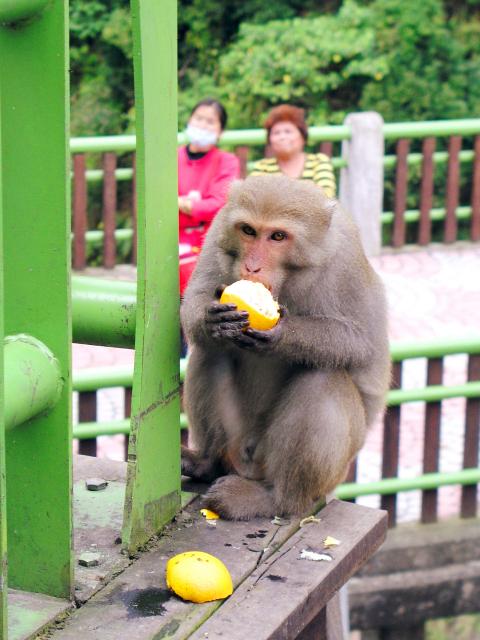Reports of macaques harassing and attacking members of the public in Greater Kaohsiung are common. The Agricultural Department of Kaohsiung has suggested that people should try to interpret macaque behavior and then make a move when they get a chance.
The number of macaques is on the increase in and around the Chaishan area, a Kaohsiung hiking mecca, and they have been harassing hikers there, at times even scratching and biting them. City councilors have urged the city government on numerous occassions to come up with a solution.
The city government has made a list of things for the public to think about and do should they encounter macaques. It recommends learning how to understand macaques’ behavior in order to reduce the incidence of the attacks.

Photo: Chang Tsun-wei, Taipei Times
照片:自由時報記者張存薇
The Department of Agriculture has come up with three categories of macaque behavior: hostile, aggressive and submissive. Hostile behavior includes “glaring”, “baring teeth in a threatening way” or “charging,” aggressive behavior means “chasing” and “attacking,” while submissive behavior is “showing teeth” and “crouching.”
However, the department’s descriptions are confusing. Its description of “glaring,” for example, includes mouth closed, eyes fixed on a specific object, the forehead and upper eyelids twitching, and sometimes raising its forehead so that its lower jaw juts out, moving its jaw back and forth.
According to the Agricultural Department, if people come across macaques acting in a hostile or aggressive way, they should leave the area as quickly as possible. If the macaques are behaving submissively, it is okay to chase them away with a threatening object. However, brandishing threatening objects are not permitted in the Chaishan Nature Reserve, as it would be a violation of the Wildlife Conservation Act. Some councilors have criticized the government for failing to ensure public safety, saying that asking people to learn how to read macaque behavior is entirely impractical.
(LIBERTY TIMES, TRANSLATED BY TAIJING WU)
高雄市經常傳出民眾遭獼猴騷擾攻擊的事件,高市府農業局宣導民眾先解讀獼猴的表情,再伺機應變。
高雄健行聖地柴山地區獼猴族群越來越多,經常有登山客遭到獼猴騷擾,還有人遭獼猴抓傷、咬傷,市議員多次疾呼要求市府拿出對策。
市府日前公布民眾遭遇獼猴時的應注意事項及措施,呼籲民眾正確解讀獼猴的表情語言,才可減少人猴衝突事件。
農業局將獼猴的行為分為敵對行為、攻擊行為、臣服行為等三大類。敵對行為包括了「瞋視」、「張口威嚇」、「突進」,攻擊行為包括「追逐」、「攻擊」,臣服行為則有「露齒」、「蹲伏」。
不過,農業局對於獼猴表情的描述卻讓人一頭霧水,以獼猴的「瞋視」為例,表情包括嘴巴閉起,兩眼注視目標個體;額頭部分皮膚包含上眼瞼表現出抽動之動作;頭部有時會仰起而造成下顎突出,並做下顎前後伸縮之行為。
農業局呼籲,當獼猴出現敵對與攻擊行為時,民眾應盡快離去,當獼猴出現臣服順從行為時則可持威嚇工具驅趕,但柴山自然公園內不得使用威嚇工具,否則即觸犯野生動物保育相關規定。議員批評公部門無法保障民眾安全,還要民眾先學會看獼猴「臉色」,毫無實用性。
(自由時報記者侯承旭)

Pigs that are resistant to a deadly viral disease have been created by scientists at Edinburgh’s Roslin Institute. The gene-edited animals remained healthy when exposed to classical swine fever (CSF), a highly contagious and often fatal disease. The virus was eradicated in the UK in 1966, but there have been several outbreaks since and it continues to pose a major threat to pig farming worldwide. “Classical swine fever is a devastating disease for livestock and farmers as we saw with the outbreak in the UK, 25 years ago,” said Helen Crooke, mammalian virology deputy leader at the Animal and Plant Health Agency

Have you ever seen a circular intersection where cars continuously flow in one direction around a central island? That is a “roundabout,” a well-known alternative to traditional intersections. Drivers enter and exit at different points without relying on traffic lights. Their primary purpose is to improve traffic flow and minimize the likelihood of high-speed collisions, particularly dangerous T-bone and head-on crashes. Roundabouts have existed and been implemented for over a century. In the 1960s, the modern roundabout emerged in the UK, with added rules for yielding. Unlike intersections with red lights, roundabouts allow vehicles to continue moving at a

The stress of a long workday was really weighing Sarah down, and she felt the urgent need to get away. The moment the thought of escape crossed her mind, her fingers flew to the keyboard and typed “travel destinations.” Later, while she was casually scrolling through her social media, she was met with a flood of travel ads. There were lots of options, such as a serene hideaway in Kyoto and a luxurious beach villa in Bali, each perfectly echoing her desire. This is the magic of the recommender system at work. Recommender systems offer personalized suggestions by tracking your digital

對話 Dialogue 清清:明天我想請一天假。 Qīngqing: Míngtiān wǒ xiǎng qǐng yì tiān jià. 華華:為什麼?這個月的假已經很多了,你還要請假啊? Huáhua: Wèishénme? Zhège yuè de jià yǐjīng hěn duō le, nǐ háiyào qǐngjià a? 清清:因為明天是農曆九月初九重陽節,重陽節是老人節,我想陪我阿公阿嬤去爬山,而且家裡也要拜祖先,請假比較方便。 Qīngqing: Yīnwèi míngtiān shì nónglì jiǔ yuè chū jiǔ Chóngyáng Jié, Chóngyáng Jié shì Lǎorén Jié, wǒ xiǎng péi wǒ āgōng āma qù páshān, érqiě jiālǐ yě yào bài zǔxiān, qǐng jià bǐjiào fāngbiàn. 華華:了解,是應該陪老人出去走走。阿公阿嬤應該會拿到政府發的紅包吧? Huáhua: Liǎojiě, shì yīnggāi péi lǎorén chūqù zǒuzǒu. Āgōng āma yīnggāi huì nádào zhèngfǔ fā de hóngbāo ba? 清清:有啊!65歲以上的長輩都會領到敬老金,只是每個縣市給的數字不太一樣,年紀越大,拿到的會越多喔! Qīngqing: Yǒu a! Liùshíwǔ suì yǐshàng de zhǎngbèi dōu huì lǐngdào jìnglǎojīn, zhǐshì měi gè xiànshì gěi de shùzì bútài yíyàng, érqiě niánjì yuè dà, ná dào de huì